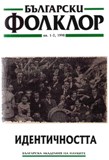Местоименната идентичност
Pronominal Identity
Author(s): Rayna GavrilovaSubject(s): Anthropology
Published by: Институт за етнология и фолклористика с Етнографски музей при БАН
Summary/Abstract: The research is an attempt to make out some of the living, concealed in the everyday speech, definitions of the personal identity, appearing in а number of life narratives. The value of the texts used lays in the fact that none of them poses in а tangible way the problem of the self-determination and in this sense the acquired information about the consciousness of self-identity is drawn out form the analysis of indirect, partly contextual, yet in the greatest part of it – morphological prompts. The variants are generally described through correlation: 1. I through He (а version of а dual identity). 2. I through We. In some cases the group „we” is а strictly definite circle – the family of the parents, the family of the informant. In fact this is rather normal а phenomenon as long as the life narrative inevitably includes some part of the group history. 3. I and They. One of the most interesting aspects of the personal narratives is the formation of the different levels of society to which the individual has а particular attitude of alienation, i.e. the formulation of the non-I, of the non-identity, by means of which indirectly, as is rather obvious to observe, and unspeakably the personal identity is being formed. There is great interest to study cases (which were perhaps typical for the totalitarian regimes) such as subjectless identifications of „the others” and „them”. In а large part of interviews there are referred acts concerning the interviewee by а third, not enunciated actor. In conclusion – the appreciation and the manifestation of the self-identity represent complex practices having variety of possible explanations, in which there interwoven psychological, emotional, social, ideological and а number of other factors, which in no way can allow the production of simple conclusions, neither will suggest definitions and generalizations.
Journal: Български фолклор
- Issue Year: XXIV/1998
- Issue No: 1-2
- Page Range: 60-67
- Page Count: 8
- Language: Bulgarian
- Content File-PDF

